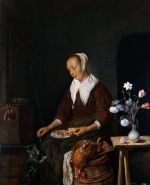The consolation of little animals
Using a dead-end design, Leeuwenhoek had an instrument that was up to an order of magnitude better than anyone else had.
What he saw was very difficult for anyone else to see. He was so far ahead of his time that his discoveries had no context. What he saw, no one suspected, understood, or knew what to do with.
How was he able to do it?
He developed strategies to maintain his independence and autonomy.
Leeuwenhoek did not inherit any wealth, so he had a day job -- his drapery business -- and he had a couple of civic appointments that at some point must have let him quit his day job. Most importantly, he preserved his independence and autonomy by, in a passive way, controlling access to his time and his knowledge.
He did no teaching. He wrote to Leibniz on September 28, 1715:
To train young people to grind lenses, and to found a sort of school for this purpose, I can't see there'd be much use ... because most students go there to make money out of science, or to get a reputation in the learned world. But in lens-grinding, and discovering things hidden from our sight, these count for nought.
He had no professional affiliations beyond the Royal Society, and they were in England. He never visited the Society's offices or attended a meeting, at which he would have been welcomed. Indeed, he never left Holland after he began his researches.
While he took lots of suggestions, he had no supervision. He did it with his own money on his own time in his own way as an outsider to the politics of the academic and religious communities.
Leibnitz wrote to Christiaan Huygens on 2 March 1691:
I prefer a Leeuwenhoek who tells me what he sees to a Cartesian who tells me what he thinks.
Leeuwenhoek wrote on June 12, 1716:
I've spent more time than many will believe [making microscopic observations], but I've done them with joy, and I've taken no notice those who have said why take so much trouble and what good is it?
Of equal importance, Leeuwenhoek lived at a time when serious, respected researchers sought the universal elixir, the transmutation of metals, and the future in the positions of the stars. He lived before the exposure of such alchemical and astrological folly, before the development of what we call "academic disciplines" and "science", a noble quest indeed, but one that has led to our world of increasingly narrow specializations, massive digitized data sets, hyper-competitive funding proposals, corporate secrecy, intellectual property litigation, and an unreadable quantity of relevant publications.
If he were alive today, what would Leeuwenhoek specialize in? If he had a job, an official position, an agenda of committee meetings, if he had to write funding proposals and sign confidentiality agreements and work on teams and ask permission or get authorization to do everything he did, that is, if he were in our laboratories and classrooms today, sitting next to you, would he accomplish as much? Will you?
What do you do when you see things that no one has ever seen before?Wat doe je als je dingen zie dat niemand ooit heeft gezien?
What motivated scientists before the introduction of institutional incentives? Leeuwenhoek wrote:
My work, which I've done for a long time, was not pursued in order to gain the praise I now enjoy, but chiefly from a craving after knowledge, which I notice resides in me more than in most other men.















